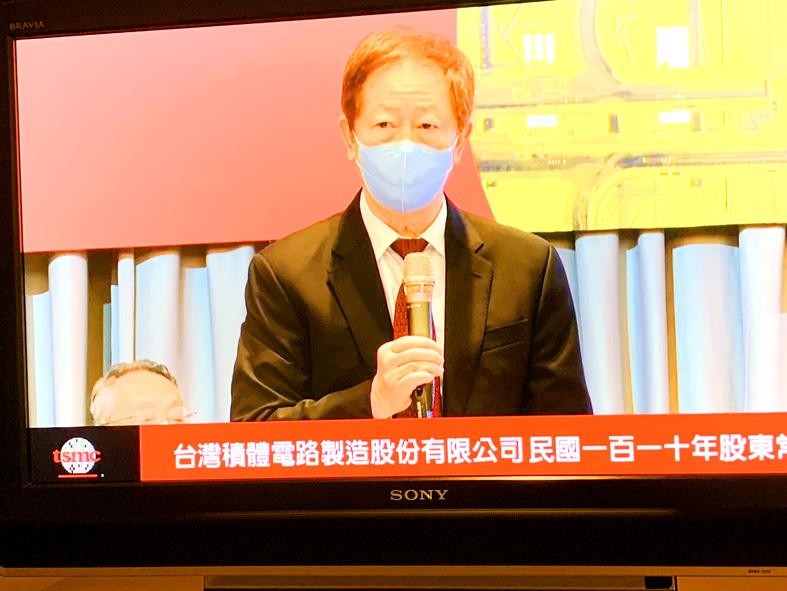Taiwan Semiconductor Manufacturing Co (TSMC, 台積電) is evaluating the feasibility of constructing a semiconductor fabrication plant in Germany as it continues to expand overseas, it said yesterday.
A shareholder at the contract chipmaker’s annual general meeting in Hsinchu City yesterday asked about the possibility following media reports earlier this month that TSMC was approached by the German government about building a chip fab in the country, as Europe joins the US and China in establishing local chip supplies in a bid to avert future chip shortages.
“About the German fab, we are seriously looking into it, but it is still in its infancy,” TSMC chairman Mark Liu (劉德音) told the annual general meeting. “We have close communication with several of our major clients in Germany. We will continue to communicate with them about what would be in the best interest of our clients, but we are still in very early talks.”

Photo: Grace Hung, Taipei Times
The US is to be the first major overseas chip manufacturing site for TSMC, as it started constructing an advanced 12-inch fab in Arizona earlier this year. Using 5-nanometer technology, the fab is expected to start production in the first quarter of 2024.
Japan could be TSMC’s second overseas site, as the chipmaker said that it is carrying out due diligence regarding building a fab there.
“The decision to build a fab in the US and the evaluation of constructing another one in Japan are all based on customer demand,” Liu said. “About 70 percent of TSMC’s business comes from the US.”
The Arizona fab would support demand in the infrastructure and national security segments, although the volume would be relatively small, Liu said.
Addressing shareholder concern over expensive manufacturing costs from overseas fabs diluting the company’s gross margin, Liu said that the expansion is backed by its clients, who are willing to share the cost and help overcome the difficulties.
The chipmaker declined to comment on partnerships with clients, he said, referring to a shareholder’s question about a potential collaboration on fab construction with Sony Corp and German auto chip supplier Infineon Technologies AG.
Manufacturing costs in Japan are much higher than in Taiwan, Liu said, adding that the goal is to balance manufacturing costs between its Japanese and Taiwanese fabs.
The company is confident of reaching its five-year goal of keeping gross margin at 50 percent, Liu said, adding that even now, it is aiming higher than 50 percent.
Shareholders also asked whether Washington’s and Beijing’s plans to build independent semiconductor supply chains could jeopardize TSMC’s business.
Liu said that he was not concerned about the countries’ localization plans, as their semiconductor supply chains would be partial.
The majority of semiconductors used in consumer electronics, such as smartphones, would continue to be made at fabs with cost efficiency, he added.
Revenue for the whole of this year is expected to increase more than 20 percent in US dollar terms, surpassing the global industry average of 17 percent, TSMC chief executive officer C. C. Wei (魏哲家) said.

Macronix International Co (旺宏), the world’s biggest NOR flash memory supplier, yesterday said it would spend NT$22 billion (US$699.1 million) on capacity expansion this year to increase its production of mid-to-low-density memory chips as the world’s major memorychip suppliers are phasing out the market. The company said its planned capital expenditures are about 11 times higher than the NT$1.8 billion it spent on new facilities and equipment last year. A majority of this year’s outlay would be allocated to step up capacity of multi-level cell (MLC) NAND flash memory chips, which are used in embedded multimedia cards (eMMC), a managed

CULPRITS: Factors that affected the slip included falling global crude oil prices, wait-and-see consumer attitudes due to US tariffs and a different Lunar New Year holiday schedule Taiwan’s retail sales ended a nine-year growth streak last year, slipping 0.2 percent from a year earlier as uncertainty over US tariff policies affected demand for durable goods, data released on Friday by the Ministry of Economic Affairs showed. Last year’s retail sales totaled NT$4.84 trillion (US$153.27 billion), down about NT$9.5 billion, or 0.2 percent, from 2024. Despite the decline, the figure was still the second-highest annual sales total on record. Ministry statistics department deputy head Chen Yu-fang (陳玉芳) said sales of cars, motorcycles and related products, which accounted for 17.4 percent of total retail rales last year, fell NT$68.1 billion, or

In the wake of strong global demand for AI applications, Taiwan’s export-oriented economy accelerated with the composite index of economic indicators flashing the first “red” light in December for one year, indicating the economy is in booming mode, the National Development Council (NDC) said yesterday. Moreover, the index of leading indicators, which gauges the potential state of the economy over the next six months, also moved higher in December amid growing optimism over the outlook, the NDC said. In December, the index of economic indicators rose one point from a month earlier to 38, at the lower end of the “red” light.

MediaTek Inc (聯發科) shares yesterday notched their best two-day rally on record, as investors flock to the Taiwanese chip designer on excitement over its tie-up with Google. The Taipei-listed stock jumped 8.59 percent, capping a two-session surge of 19 percent and closing at a fresh all-time high of NT$1,770. That extended a two-month rally on growing awareness of MediaTek’s work on Google’s tensor processing units (TPUs), which are chips used in artificial intelligence (AI) applications. It also highlights how fund managers faced with single-stock limits on their holding of market titan Taiwan Semiconductor Manufacturing Co (TSMC, 台積電) are diversifying into other AI-related firms.